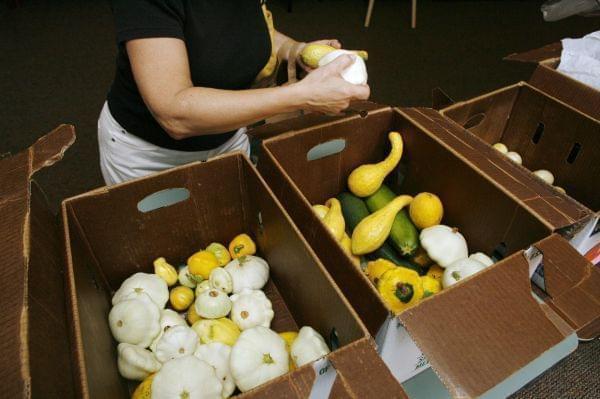How The CSA Market Is Changing; Poverty Affects Our Genes; The Future Of Work And Education

John Amis/AP
It’s been a tough few years for farmers who sell produce through CSAs in part to more competition from big grocery stores and others cashing in the local food market. How are these farmers are adapting and what can policymakers can do to help? Plus, nature versus nurture is one of the oldest debates there is. But the answer might actually be neither. And, Rep. Bill Foster joins us to talk about the future of work and education.
We’re in the middle of spring and this time of year, if you’ve bought shares from a Community Supported Agriculture, or CSA farm, you’ll most likely be getting your fresh produce on a regular basis soon.
CSAs allow consumers to buy produce directly from small farmers. But times are actually pretty hard for CSA farmers. The market has gotten a lot tougher in the past few years, and its led CSA farmers to try and adapt in order to stay competitive.
Shea Belahi is one of these farmers. She’s part owner and farm manager of Blue Moon Farm in Urbana. Simon Huntley also joined us. He’s the founder and CEO of Harvie, which is a company that helps small farms with marketing and technology.
Guillermo Payet is founder and president of Local Harvest which is a website and database for CSAs and farmers markets. He’s based in Santa Cruz California.
"The market has changed for sure. We're noticing a lot of bigger grocery stores that offer organics... and the convenience factor changes how the market works for sure," says Shea Belahi from Blue Moon Farm.
— The 21st (@21stShow) April 16, 2019
Plus--
How much of your life is about your decisions and how much of it was already determined at birth? That’s the nature versus nurture debate that’s at the heart of many issues whether we’re thinking about public health, education, or economic mobility.
According to researchers at Northwestern University, the answer might be neither. That’s because of the way the human genome actually works and, a new study shows that experiencing poverty actually affects our genes in a significant way.
Thomas McDade is the lead author of this study. He’s a professor of anthropology and a faculty fellow at Northwestern’s Institute for Policy Research. Calen Ryan was part of the research team. He’s a PhD candidate at Northwestern, specializing in human biology and reproductive ecology.
.@IPRatNU have followed a group of people born in 1983 from childhood to adulthood.
— The 21st (@21stShow) April 16, 2019
They've found that nearly 10 percent of the genes were influenced by socioeconomic status. Read more of their research here: https://t.co/gapm6bvb1F
And--
In just a few weeks, many students attending four-year colleges will graduate. And in some ways, it’s a good job market with the latest national unemployment numbers at 3.8 percent. The Illinois unemployment rate is 4.3 percent.
But it’s also a mixed bag. You may know that the U.S. has lost five and a half million manufacturing jobs since 2000, for instance. On the other hand, the federal government projects we’ll see the biggest job growth in high and low-paying work, like software development, and home care.
Congressman Bill Foster has been thinking about these challenges and how we can prepare for them. He co-chairs a task force of Democratic House members focused on the future of work.
We also spoke with Kelli Hill. She’s vice president of continuing education and advancement at Heartland Community College in Normal.
"When we talk about work-ready, we really are focusing more on shorter-term programs, that are anywhere from 4 weeks to 3 terms, or 18 months...we're making sure students have 'stackable' credentials.'
— The 21st (@21stShow) April 16, 2019
-Kelli Hill, VP at @Heartland_CC
